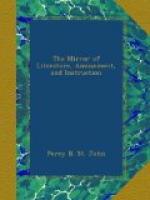“Then came the disappointment of his youthful passion,—the lassitude and remorse of premature excess,—the lone friendlessness of his entrance into life, and the ruthless assault upon his first literary efforts,—–all links in that chain of trials, errors, and sufferings, by which his great mind was gradually and painfully drawn out;—all bearing their respective shares in accomplishing that destiny which seems to have decreed that the triumphal march of his genius should be over the waste and ruins of his heart. He appeared, indeed, himself to have had an instinctive consciousness that it was out of such ordeals his strength and glory were to arise, as his whole life was passed in courting agitation and difficulties; and whenever the scenes around him were too tame to furnish such excitement, he flew to fancy or memory for ‘thorns’ whereon to ‘lean his breast.’” At the same time, the melancholy with which his heart was filled was soothed and cherished by the associations which every object in Venice inspired. The prospects of dominion subdued, of a high spirit humbled, of splendour tarnished, of palaces sinking into ruins, was but too faithfully in accordance with the dark and mournful mind which the poet bore within him. Nor were other motives of a nature wholly different wanting to draw him to Venice.[1] How beautifully has the poet illustrated this preference:—
In Venice Tasso’s echoes are no
more,
And silent rows the songless gondolier;
Her palaces are crumbling to the shore,
And music meets not always now the ear:
Those days are gone—but Beauty
still is here.
States fall, hearts fade—but
Nature doth not die,
Nor yet forget how Venice once was dear,
The pleasant place of all festivity,
The revel of the earth, the masque of
Italy.
But unto us she hath a spell beyond
Her name in story, and her long array
Of mighty shadows, whose dim forms despond
Above the dogeless city’s vanish’d
sway;
Ours is a trophy which will not decay
With the Rialto; Shylock and the Moor,
And Pierre, cannot be swept or worn away—
The keystones of the arch! though all
were o’er,
For us repeopled were the solitary shore.
Her desolation:—
Statues of glass—all shiver’d—the
long file
Of her dead Doges are declined to dust;
But where they dwelt, the vast and sumptuous
pile
Bespeaks the pageant of their splendid
trust;
Their sceptre broken, and their sword
in rust;
Have yielded to the stranger: empty
halls,
Thin streets, and foreign aspects, such
as must
Too oft remind her who and what enthrals,
Have flung a desolate cloud o’er
Venice’ lovely walls.
* * * * *




